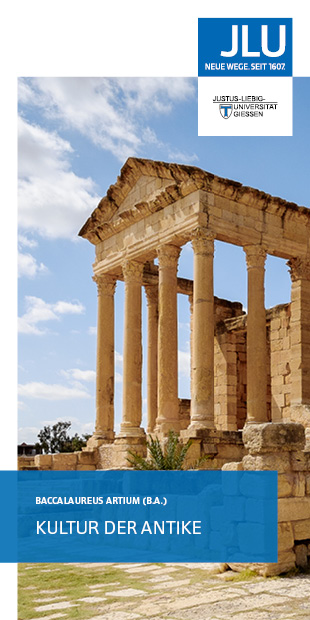The Culture of the Ancient World (B.A.)
Taught in German
Overview
- Overview
-
Aim of studies
For the course of study Culture of the Ancient World the four academic disciplines, Classical Archaeology, Ancient History, Latin and Greek have been put together to form a single, historico-cultural oriented discipline - Classical and Ancient Studies.
Together with the subject knowledge of the culture of the ancient world, through the interdisciplinary approach of the course structure the skill of understanding and working in this structured network is taught and expanded. The links between the varieties of subject jargon, which are always necessary with the different methodologies, the variety of questions and perspectives dealt with, the media and research findings, create and broaden the skill of integrating one’s own skills and those of others and presenting and communicating in a way that goes beyond one’s own horizon. Concerning oneself with the ”closest foreign” in ancient civilization in their literary, material and historical image and their socio-cultural form and relations promote a conscious perception of the other and the strange and enhances the ability of critical, historically-based and cross-cultural judgement.
The course of study imparts a subject-specific education (BA) which can be the foundation for a deepening of knowledge in an MA course of study.Subject-specific prerequisites
The qualification in Latin is required for this course of study. Evidence must be provided upon enrolment. On request the board of examiners verifies the equivalency of the knowledge in Latin.
-
Number of enrolled students
12 students are enrolled in this bachelor degree course (as of winter semester 2017/18).
Accreditation
since 10 November 2005.
Composition of the Study Programme
- BA
-
Degree
Baccalaureus Artium (BA)
- Duration of studies 6 Semester 180 Credit Points (CP)
-
Duration of Studies
6 Semesters - 180 Credit Points (CP)
- Composition of the Study Programme
-
Composition and content of degree programme
In the first year of studies (semester 1 - 2) the students complete 6 basic modules, which deal with basic material and methodological subjects and elementary linguistic training in the ancient languages.
Afterwards they select a core subject from the four disciplines (i.e. ancient history, classical archaeology, Latin philology or Greek philology), which, from then on, they study in greater depth.
In the second year and the first half of the third year of study (semester 3 – 5) they go through the core training in the core subject modules I - III and the language training. They also take part-modules in the ancient studies classes in subjects not taken as core classes (expansion modules) and either modules on modern languages or modules on related subjects (e.g. art history, theology or another historical discipline, so-called free choice modules).
In this part of the studies, moving more deeply into the subject, a practical course, an excursion and the presentation of students’ own projects (in-depth module) also take place. If one of the two ancient languages has been chosen as a core subject, knowledge of these will be extended through two language modules which build on each other. In the sixth semester the subject core training finishes with core module IV and the BA thesis is written.
Application
- Commencement of Studies in the Winter Semester
-
Commencement of studies
Only possible in the winter semester
- Entrance Requirements Abitur ohne Praktikumsnachweis
-
Entrance requirements
- Applicants must have an Abitur (German school leaver's examination for university entrance) or equivalent. More on this...
- Certification of a pre-professional practical period is not required.
-
Special regulations apply to foreign applicants or those who gained their university-entrance qualifications abroad. Read more...
- Latin language certificate
-
Latin language certificate
The qualification in Latin is required for this course of study. Evidence must be provided upon enrolment. On request the board of examiners verifies the equivalency of the knowledge in Latin.
- Application not limited only winter
-
-
Application / Enrolment
-
The study programme is not subject to admission restrictions.
-
The enrolment period for the winter semester begins at the beginning of June.
-
The end of the enrolment period is determined anew each year, please enquire in the application portal during the enrolment period.
Different rules apply in some cases for international applicants. More...
-
-
- Application period
-
Please note that the application period for the Bachelor's course can be extended. This information will be published here (in German).
Career Options
- Career Options
-
Career options
Herewith the course of study represents an important stage in qualification for jobs in pertinent subject-specific areas in
- museums,
- universities,
- permanent research projects in academies,
- academic libraries,
- specialised publishing houses.
Other areas of employment which in principle are opened with the completion of the BA are communication and dissemination of learning in the cultural sector, cultural journalism in the printed and audiovisual media, the development of learning software and other multi-medial implementations.
Furthermore, through the integration of the module, "general competencies", "Culture of the Ancient World", which optionally (and desirably) can be augmented with another vocational practical course and thus imparts, as an humanistic course of study, general skills which qualify students for work in cultural-political institutions, in cultural and research management, particularly in public relations and public relations of businesses, in adult education and tourism.
Further Information
- Further Information: Documents
-
PDF documents for the courses of study
- Flyer (in German)
- Study guide (in German)
Examination- and study regulations
- Special regulations
(with module descriptions and module plans)
(Please note that only the German version of the modules is offical and legally binding. The english Version is for informative purposes only.) - General study regulations for modular and multi-stage study programmes
Courses offered in the course catalogue
- Electronical course catalogue (in German)
- Bachelor's Degree Programmes of Faculty 04
-
- History and Culture
possible major subjects
- Protestant Theology
- History
- Journalism and Public History (only possible as 2nd major)
- Catholic Theology
- Classical Archaelogy
- Eastern European History
- Classical Philology/ Greek
- Classical Philology/ Latin
- Art History
- Art Education
- Music
- Music Education
- Philosophy
- Protestant Theology
- The Culture of the Ancient World
- History and Culture
- International pages
-
Please have a look at our International Pages for more information in English.
- Any Questions
-

Any Questions?
Information- and advisory services of JLU can be found under the category “contact” on this page!
- Help
-
Do you need assistance in choosing the right courses of study?
- Offers: Courses of study
-
Which courses of study suits me best?

Ask Justus offers information for prospective students
Events for prospective students

There is a whole range of events offered by JLU, current events can be found under “news”:
www.uni-giessen.de/studium (in German)
Contact
- Contact
- Subject Advisors
- Subject Advisors
-
Greek Philology
Mario Baumann
Institut für Altertumswissenschaften, Klassische Philologie
Philosophikum I, building G, room 131
Otto-Behaghel-Straße 10
35394 Gießen
Phone: 0641 - 99 31031
Mario.Baumann@klassphil.uni-giessen.deLatin Philology
Helge Baumann
Institut für Altertumswissenschaften, Lateinische Philologie
Philosophikum I, building G, room 146
Otto-Behaghel-Straße 10
35394 Gießen
Phone: 0641 - 99 31022
Helge.Baumann@klassphil.uni-giessen.deAncient History
Dr. Susanne Froehlich
Institut für Altertumswissenschaften
Philosophikum I, building G, room 246
Otto-Behaghel-Straße 10
35394 Gießen
Phone: 0641 - 99 28084
Susanne.Froehlich@geschichte.uni-giessen.deArchaeology
Dr. Vasiliki Barlou
Institut für Altertumswissenschaften, Klassische Archäologie
Philosophikum I, building D
Otto-Behaghel-Straße 10
35394 Gießen
Phone: 0641 - 99 28051
Sekretariat@archaelogie.uni-giessen.de
- Central Study Advisor
- Natascha Koch
- Central Student Services
-
- Students office →
(for formal matters like matriculation) - Central student advisory office
(advice for students & prospective students) - Hotline Call Justus
(first contact for all matters pertaining to studies) - International office →
(for international students)
- Students office →

